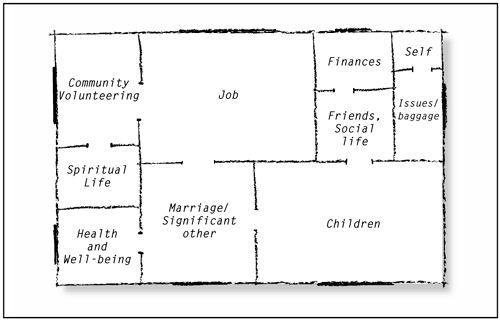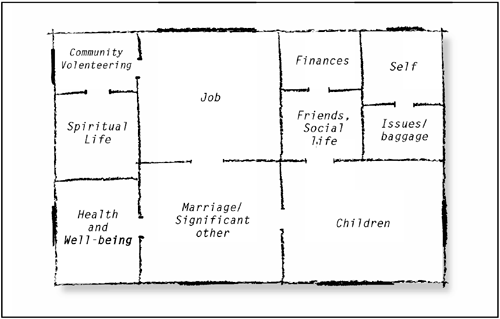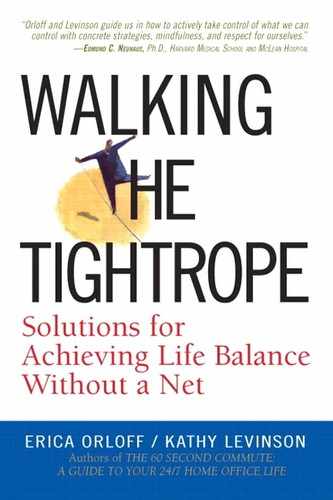There's that old adage that no one ever said on his or her deathbed, “Gee, I wish I'd put more time in at the office.” However, for most of us building a professional life, the office has a tendency to take over our lives, leaving us out of focus and out of balance.
Two other aspects come into this out-of-balance scenario. One is when our worklives are not our passions. Many of us start down a career path and find ourselves 10 or 20 years later with an enviable position and title on a business card—but somehow along the way we may have gotten into a track where we're not truly happy and most certainly not passionate about what we do. Consequently, when most of us spend more hours on the job than at home, we feel frazzled and burned out—we spend too many hours pursuing something that leaves us less than satisfied.
The other side of this coin is that our work may be such a consuming passion for us that we find ourselves in burned-out marriages or poor health because we neglect all the other areas of our life. We may pursue our careers with a single-mindedness that excludes some of the other satisfying aspects of life. We even have a name for this phenomenon—they call us “Road Warriors.”
Add to both of these situations a sluggish economy and you have people feeling they have to put in long hours and run up those frequent flyer miles on business trips because in this climate, there aren't as many great jobs from which to choose. Fear is a powerful motivator.
Imagine your life as a house with rooms for all the different areas of your life.

Draw a house of your own. Each room represents something important to you. These rooms should include:
Job: Are you working more hours than you want or should be? Is your job your dream job or have you found yourself in a position and on a track that isn't providing you with the career passion you want? Have you stagnated at work? Do you like the people you work with? Is your commute out of control—two hours one way on the train isn't unheard of in large metropolitan areas like New York and Washington, DC. Is your job a source of unending stress that follows you home at night? Is your boss or supervisor reasonable or a bully? Is your company in danger of going under? Has the staff at work been cut down with no replacements hired, thus forcing you to do the work of two people—or more? Are you fairly compensated? You will make this room reasonably sized if things feel “about right” in your career, but if it's out of alignment, then this will take up much more room than you like. It might feel like a monster-sized family room that at its heart is cold, without enough furniture to fill it.
Finances: Are you drowning in debt? Are you saving for the future? Do you have a reasonable retirement plan? Do you have a life insurance policy (even stay-at-home Moms and Dads need to make provisions should something happen to them)? This room will be reasonable if your finances feel in control. It will be large if it's a source of high stress.
Children/Created Families: Have your kids hit the teen years, and are hormones ruling your house? Are you struggling to find time for your kids? Do you have stepchildren and a blended family with some of the bumps in the road it can bring? Do any of your children face any of the following—attention deficit disorder, developmental delays, or illness? Are your kids just as burned out by the pace of the 21st century as you are? Some of us may not have kids, but we may have some form of an extended family, aging parents, and other family issues to confront. Draw this room accordingly.
Marriage/Significant Other: Do you devote the time and attention needed to keep the passion and joy in your relationship alive? Is your spouse or significant other neglected because of the demands of your career and vice versa?
Friends/Social Life: Do you have time to keep up with the friends in your life? Do you even have the kind of special friends you can call with a crisis at 2:00 in the morning? Do you get to enjoy a social life or does work eat up most of your free time? Include here hobbies that you enjoy.
Spiritual Life: Whether this is church, synagogue, mosque, or going outside and hugging a tree, your life and “house” should include time for spiritual pursuits such as prayer, meditation, or reflection.
Issues/Baggage (what from the past still brings you down?): This room should be small, if the issues from the past have been dealt with and no longer bring you down. This will grow in size if issues such as alcoholism in your family of origin, abuse as a child, or simply an unhappy home life as a kid continue to follow you into adulthood and cause you pain.
Community/Volunteering: If you haven't considered the joys of volunteering because you have no time, this may be something to look at. For many, volunteering is a source of great personal satisfaction. This may be something you've always wanted to do, but that little problem of there only being 24 hours in a day keeps getting in the way. This room will be a sliver if you don't volunteer and wish you could.
Health and Well-Being: Do you exercise a minimum of four times a week? We all know what we should do in terms of eating right, cutting back on caffeine, avoiding too much alcohol, not smoking, and so forth, but sometimes the stress of life causes us to not take care of ourselves. Again, this room will feel “right” if it's an appropriate portion of the house. If it's really tiny, that's a sign of trouble.
And finally, the room that's often just the size of a closet:
Self: Yes. Time for YOU. (What's that, you may be asking. If that's the case, draw this super small.)

Take a look at your house. If you've been honest and carefully considered the proportions, you may be shocked to find that your job consumes the biggest share. Though you may want your family or significant other to have “big rooms,” the way you're constantly moving from work to the drive-thru for dinner to the soccer field for your daughter's game, rushing home to check email, then hurriedly getting the kids to bed so you can plan for tomorrow may cause their rooms to be smaller than you'd like. Worst of all, “self” may be so tiny as to be negligible. When was the last time you did something just for you, like took a course because it interested you, invested in a hobby, or just read for pleasure, instead of using your time to prepare for a key meeting at work?
If self is so small for most of us, it's not a wonder that we often ask, “Is that all there is?” in life. Abraham Maslow, one of the greatest minds in 20th-century psychology, said we all innately strive to become “self-actualized.” A self-actualized human being has met all his or her preliminary “needs” along the way in life. This person has shelter, food, and clothing; has found true love; has met his or her social needs in the community; has found satisfaction in life itself; and now feels complete, or actualized. However, the only way to achieve this state is to have time for self and to be able to examine inwardly. Without time for self, we neglect the person who should be the most important in our own life—ourself.
Look around you. Wherever you go, there you are (which also happens to be the theme line from the 1984 classic Buckaroo Bonzai). What does that mean? Try as you might, you can't avoid taking yourself with you. In other words, you run through life at breakneck speed, too busy to really look at whether or not you are satisfied with life, and the speed factor helps you to continue to avoid looking. Then something happens. For some people it was September 11, which forced them to really examine whether all the attention on career and even material values was worth it. What was really important? For others, a health scare, the death of a parent, caretaking an elderly parent, a child's problem at school, being laid off, or something innocuous . . . simply a moment in time that calls into question values and meaning . . . forces them, or forces us, to look at whether the path we are on is really the one we want to stay on.
Is it a midlife crisis? Not really, though very often midlife or mid-career, when we are going full-tilt with all the pressures, we are forced to examine what it all means. Regardless of when or why it happens, this sense of urgency, “The Urgency Factor” as we call it, has many people questioning: “Is that all there is?”
What is The Urgency Factor? Look at how we live life nowadays. How many of us are wired and high-teched to distraction? Fifteen years ago, few of us had cellphones. Now we can't go to the local video store without calling home to our spouse or significant other with the movie selection. In fact, as more municipalities passed ordinances banning talking on cellphones while driving, what was the logical next step? It wasn't to understand that driving takes our full attention or to understand this can be dangerous and simply concentrate on the road. No, many people ran out and got hands-free cellphones.
And email. We're getting and sending emails at hours when it would be inappropriate to make a business call. After 9:00 at night, after 11:00 at night, and sometimes even on weekends. We're guilty of working to the wee hours, too.
But, in the end, what is so urgent? Why do we feel we have to be wired 24/7? What is it that can't wait until tomorrow? Why do we put our technology before our families and before ourselves? We've taken this trend for granted, without questioning how it is throwing our lives out of balance. It's causing some of the rooms in our house to become so large as to threaten the very foundation of our houses—and these rooms take away from the rooms that should be bigger.
A house is never going to be divided into 8 or 10 perfectly even rooms. Think about your dream home, whether that's where you reside right now or not. Your dream home may have a “great room,” that supersized living area. It may have smaller rooms, like a cozy den, or a smaller guest bedroom. The master bedroom may be large enough to include a seating area. In any case, you won't find a house with every room the same size.
Ideally, however, the house, when looked at as a whole, will be pleasing. To borrow from the ancient art of feng shui, it will have balance and serenity. It will be a place worth coming home to at night. It won't be so out of balance that it topples on the foundation. The foundation will be firm, strong, and architecturally sound. If you're like most of us, your dream house, this metaphor we're using for life, doesn't look that way now. And even if you take all the suggestions in this book, you have to realize that at times life will simply happen. In other words, your life may come out of balance at tax time, or maybe you will have a parent who falls ill, or you may have a health scare. For Erica, a recent surgery meant the entire house was consumed with health. For Kathy, dealing with an aging parent meant there was little time for writing. It's okay to find yourself out of balance at times. What's not okay is watching a year go by without making the kind of significant life changes that will bring you a greater sense of balance. Everything can't be urgent all of the time.
Examining the problem is the first step toward remodeling your life and your house. Now that you have taken a hard look at whether or not your life is in balance, it's time to move on to each of the areas and overhaul and then fine-tune your life so that your house looks more like this:

